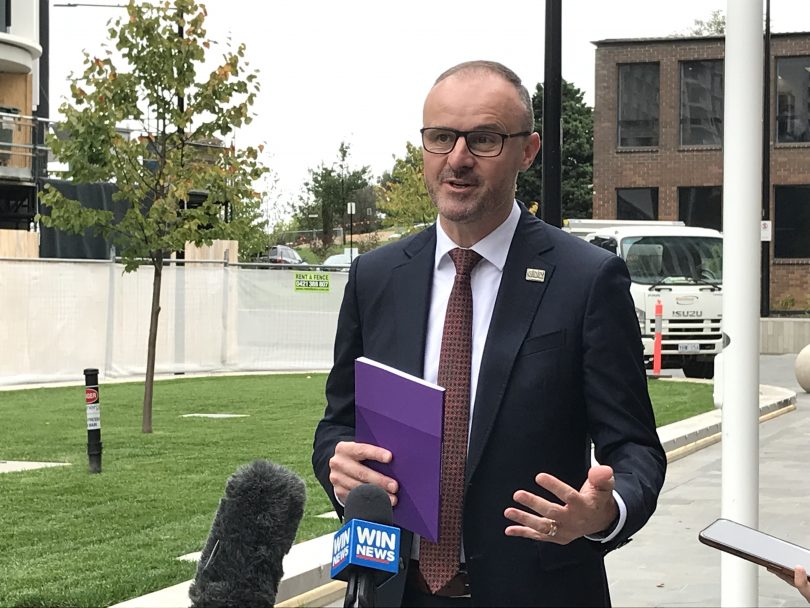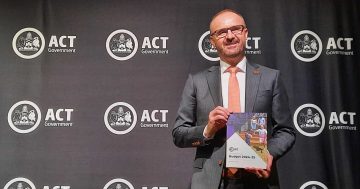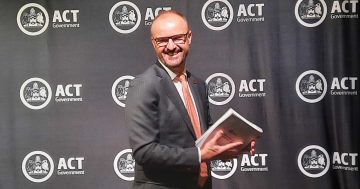
Chief Minister Andrew Barr handed down the ACT’s Budget Review with “cautious optimism”. Photo: Lottie Twyford.
As his government announces a bottom line that is $475 million better than expected over the forward estimates, Chief Minister Andrew Barr called for “cautious optimism” about the Territory’s continued post-COVID recovery.
The reason for the caution, Mr Barr warned, is that this recovery is contingent on factors that are outside the local government’s control.
Potential shocks could arise from new variants of the virus, foreign crises like the Russian invasion of Ukraine, Federal Government tax settings and Reserve Bank interest rate rises.
“We’ve experienced a V-shaped recovery, but there are still risks, which are domestic and international,” Mr Barr said.
While the ACT’s health authorities have been warning of a period of increased COVID danger over winter, Mr Barr acknowledged there was significant uncertainty around the potential impact subsequent waves and variants would have.
“The only thing I know for certain is that it comes in waves, and right now we are between waves, although it’s looking like we are heading into a period of increased case numbers,” he said.
“The virus is becoming endemic … this could be what we have to deal with every year for the rest of our lives … like flu, like other infectious diseases.”
Mr Barr noted the Federal Budget – to be handed down on Tuesday (29 March) – would provide a further degree of certainty around the Territory’s economic forecasts.
“It’s an election year, so inevitably there will be tax cuts announced,” he said.
And while Mr Barr said there was nothing in the budget review which was “reliant” on the Commonwealth providing cost of living relief, he would “welcome” any tax cuts or relief directed at lower-income households.
“What we are seeing is very low unemployment which means the Commonwealth’s social security bill is lower than they were anticipating, which ought to give them a little bit of room for targeted support,” Mr Barr explained.
Mr Barr also said he would continue to lobby the Federal Government to ensure the Territory received its fair share of election promises.
However, the Chief Minister warned it was important to monitor how the banks and the Reserve Bank manage interest rate rises, which would affect mortgage-holders in the Territory.
Mr Barr welcomed the “mature” approach banks had taken up until this point.
The budget review’s improved forecasts were also dependent on higher population growth and wage increases.
Mr Barr flagged that pay increases are on the way for ACT public servants.
According to the review, total revenue in the Territory is now forecast to be $855.8 million higher over four years to 2024-25 than what was predicted in the October budget, which Mr Barr said demonstrated a significant recovery in economic activity.
But expenses are also up by $375.8 million over the four years, largely due to spending on the Territory’s pandemic response.
The government’s deficit is now expected to peak at $770.2 million this financial year, down from the October budget forecast of $951.5 million.
By 2024-25, it will have fallen to $371.9 million.
Minimal changes were made to the financial commitments already promised in last year’s Budget, aside from an additional $105 million for health to meet pandemic-induced future demand.
An additional $185.8 million will be spent on infrastructure projects, including the Canberra Hospital expansion and upgrades to schools, taking the total spend to $6.6 billion over four years.
As announced last week, over $150 million will be allocated to building a new school in Strathnairn, as well as upgrades to Narrabundah College and Garran Primary School.

Opposition leader Elizabeth Lee said the budget review was full of “glaring holes”. Photo: Lottie Twyford.
Opposition leader Elizabeth Lee was scornful of the government’s budget review.
She argued additional funding to health and education did nothing to “ensure that all Canberrans can have choice when it comes to housing”.
“There is nothing in this budget review that will give any confidence to Canberrans that they can work towards the dream of owning their own home.”
According to Ms Lee, Mr Barr’s “spruiking” of his government’s investments in health and education did little to address the fact that the Territory’s health system consistently performs poorly compared with other jurisdictions.




















